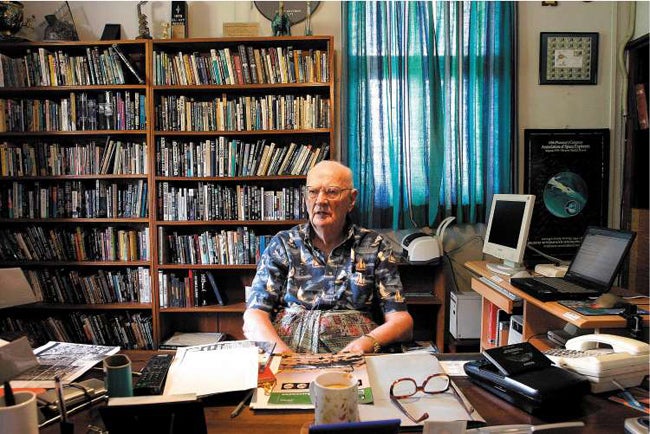Arthur C Clarke's last words – from beyond the stars

He gave the world 2001: A Space Odyssey and the concept of the intelligent computer in the form of the murderous Hal. He predicted geostationary satellites and space stations. Now, four months after his death, Arthur C Clarke prepares to dazzle the world one final time when his last novel is published.
The Last Theorem was bought for a six-figure sum by the publisher HarperCollins earlier this year. Due to Clarke's ill health, the book was finished by the respected science-fiction author Frederik Pohl, who, like Clarke, holds a Grand Master award from the Science Fiction and Fantasy Writers of America.
The novel outlines a plot by aliens to invade Earth; an astronomy student's obsession with Fermat's last theorem; a UN bombing campaign; and another of Clarke's predictions – space elevators. The concept involves a huge cable connecting the Earth to orbital altitude, along which elevators can be launched using electromagnetic vehicles.
"I'm often asked when I think the space elevator will be built," Clarke said in his last interview. "My answer is about 10 years, when everyone stops laughing."
Speaking this weekend from Palatine, Illinois, Mr Pohl revealed that the tensions between the Tamil Tigers and the Sri Lankan government were major inspirations for the novel.
"When Arthur and I were doing a lecture tour in Japan about 30 years ago, he would often go and check the news because the fighting was getting closer to his diving school on the coast of Sri Lanka," Mr Pohl said. "You don't write science fiction in a vacuum; you can't ignore the things that already exist."
Mr Pohl explained that illness and writer's block had prompted Clarke to ask for his help: "Arthur said to me that he woke up one morning and didn't know how to write any of the books he had contracted. The stories had just gone out of his head."
With the bare bones of the story and a handful of notes to work with, Mr Pohl shaped the novel from Clarke's visions and ideas over two years. "Everything in the novel is something he either suggested or wrote or I discussed with him," Mr Pohl said.
Chris Smith, editorial director at HarperCollins, said the publisher had been very pleased to win the book: "Everyone was aware that Arthur had stated that this would be the last book he would write – perhaps because he knew his health was fast failing due to complications from the post-polio syndrome that had plagued him for decades."
Unfinished works
Jane Austen began writing 'The Watsons' in 1803 but abandoned it when her father died. Austen's niece, Catherine Hubback, completed it some 50 years later under the title 'The Younger Sister'.
Mark Twain worked on 'The Mysterious Stranger' periodically from 1890 until his death in 1910. It was completed posthumously by his biographer, Albert Bigelow Paine, in 1916.
Charles Dickens 'The Mystery of Edwin Drood' was originally due to be published in 12 installments, but only six were completed before Dickens's death in 1870. Many writers have tried to supply a conclusion.
Edith Wharton 'The Buccaneers' was published in an incomplete form a year after Wharton's death in 1937. Marion Mainwaring, a Wharton scholar, finished the novel, which was published in 1993.
JRR Tolkien 'The Silmarillion' is a collection of works that were published posthumously by the author's son Christopher and the writer Guy Gavriel Kay in 1977.
Join our commenting forum
Join thought-provoking conversations, follow other Independent readers and see their replies
Comments